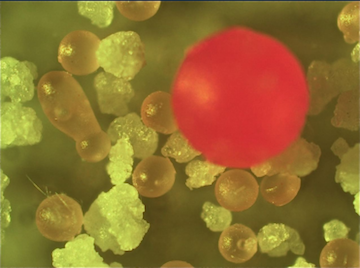400316-microbeads.png

Microbeads Credit: University of Washington, Tacoma.
Your shower gel, eye makeup, and even toothpaste may develop a slightly different feel in the years ahead. That’s because the United States has banned one of their key ingredients: tiny balls of plastic known as microbeads.
As the name suggests, most of these beads are microscopic. They’ve been used as abrasives in many personal cleaning products, and as lubricants in many cosmetics. The problem, though, is that when you rinse them off, they don’t stop — they can rinse into rivers, lakes, and all the way into the oceans.
A recent study found that Americans wash about 800 trillion of these beads down the drain every day. Waste water treatment plants may catch 99 percent of them — but that leaves a lot of tiny plastic balls to float away. And much of the leftover solid waste can be used as fertilizer, allowing many of the captured particles to float away as well.
And that’s not good for marine life. Fish, birds, and other creatures may mistake the beads for fish eggs or other goodies. The beads fill their stomachs, so they don’t eat as much real food, leaving them undernourished. The beads can also absorb soot and chemicals from the environment, poisoning the creatures that eat them. Eventually, the beads can work their way up the food chain, causing problems all along the way.
In 2015, Congress banned microbeads in the cleaners that we rinse down the sink. That’ll reduce the number of beads that wash out to sea — cleaning up the environment by cleaning up our personal cleaning products.

